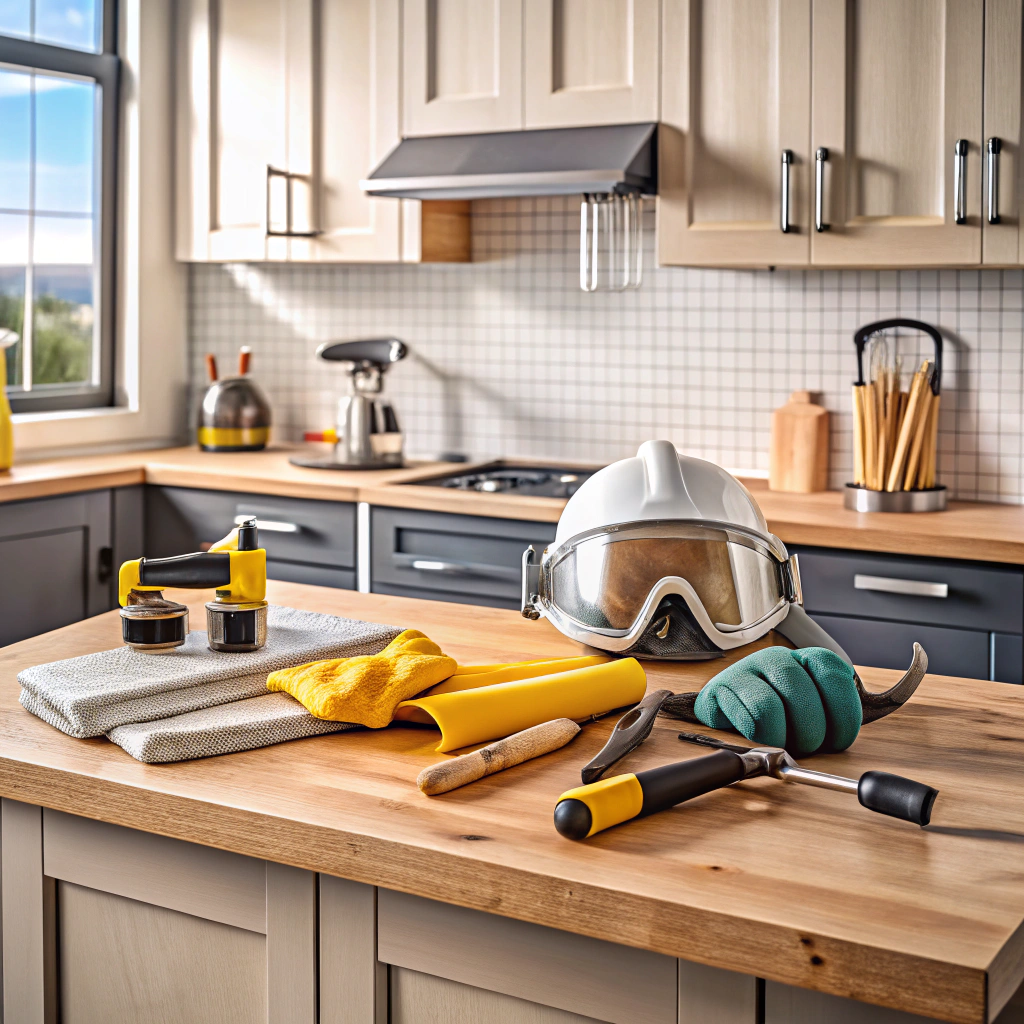Last updated on
Discover whether you need a permit to replace your kitchen cabinets and navigate the renovation process with ease.
Are you planning to give your kitchen a makeover by replacing the old cabinets with new ones? It’s a great way to refresh the look and feel of your kitchen without breaking the bank. However, before you start tearing down those old cabinets, it’s essential to know if you need a permit for this renovation project.
While some home improvement projects don’t require permits, others do. In this article, we’ll discuss whether or not you need a permit to replace kitchen cabinets and what factors determine whether or not one is necessary.
So let’s dive in!
Key takeaways:
- A permit may be required for replacing kitchen cabinets depending on local regulations.
- Permits ensure work is done safely, up to code, and protect homeowners from legal issues.
- Rules and regulations for cabinet replacements vary by state or city.
- Local regulations may require permits for structural changes, electrical, and plumbing work.
- Check with your local building department to determine if a permit is needed.
What's Inside
Understanding Kitchen Cabinet Replacement Permits

When it comes to home renovations, permits can be a confusing topic. Many homeowners are unsure whether they need one for their project or not.
Kitchen cabinet replacement is no exception. Understanding the permit requirements for this type of renovation is crucial to avoid any legal issues down the line.
A kitchen cabinet replacement permit allows you to legally replace your old cabinets with new ones while ensuring that all safety and building codes are met during installation. The purpose of these permits is to ensure that your renovation meets local regulations and standards, including electrical wiring, plumbing fixtures, ventilation systems and more.
It’s important to note that every city has its own set of rules regarding kitchen remodels and replacements; therefore it’s essential always check with your local government office before starting any work on your cabinets.
Importance of Permits

They ensure that the work is done safely and up to code. Permits also protect homeowners from potential legal issues down the road if something goes wrong during or after the renovation.
When it comes to replacing kitchen cabinets, permits may be required depending on various factors such as local regulations and whether structural changes are being made. It’s important to check with your local building department before starting any work.
Obtaining a permit can seem like an unnecessary hassle, but it’s worth taking the time and effort to do so properly. Not only does it ensure compliance with laws and regulations, but having a permit can also increase your home’s value when you decide to sell in the future.
Working without a permit could result in fines or even having to undo all of your hard work if discovered by authorities later on.
Laws and Regulations for Cabinets

These rules vary depending on the state or city where you live. In general, building codes require permits for any structural changes made to a home, including cabinet replacement.
The purpose of these regulations is to ensure that all renovations meet safety standards and do not pose a risk to occupants or the property itself. For example, if you’re planning on installing new cabinets in an area with electrical outlets or plumbing fixtures nearby, your local building department may require additional inspections before issuing a permit.
It’s important to note that failure to obtain proper permits can result in fines and legal consequences down the line. Unpermitted work can make it difficult for homeowners when they try selling their homes as buyers will want proof of compliance with local laws.
Local Regulations for Kitchen Remodels

Some cities and towns require permits for all types of home renovations, while others only require them for major projects. It’s important to research the specific regulations in your area before starting any work on your kitchen.
In some cases, you may need a permit just to replace cabinets or countertops. Other times, you may be able to do minor updates without a permit but will need one if you’re making significant changes like moving walls or adding new electrical outlets.
To ensure that you’re following all local regulations and obtaining the necessary permits before beginning your project, it’s best to consult with a professional contractor who is familiar with the rules in your area.
By taking these steps upfront and ensuring that everything is up-to-code from the start of your renovation project, you’ll avoid potential headaches down the road when trying to sell or refinance your home.
Types of Kitchen Remodel Permits
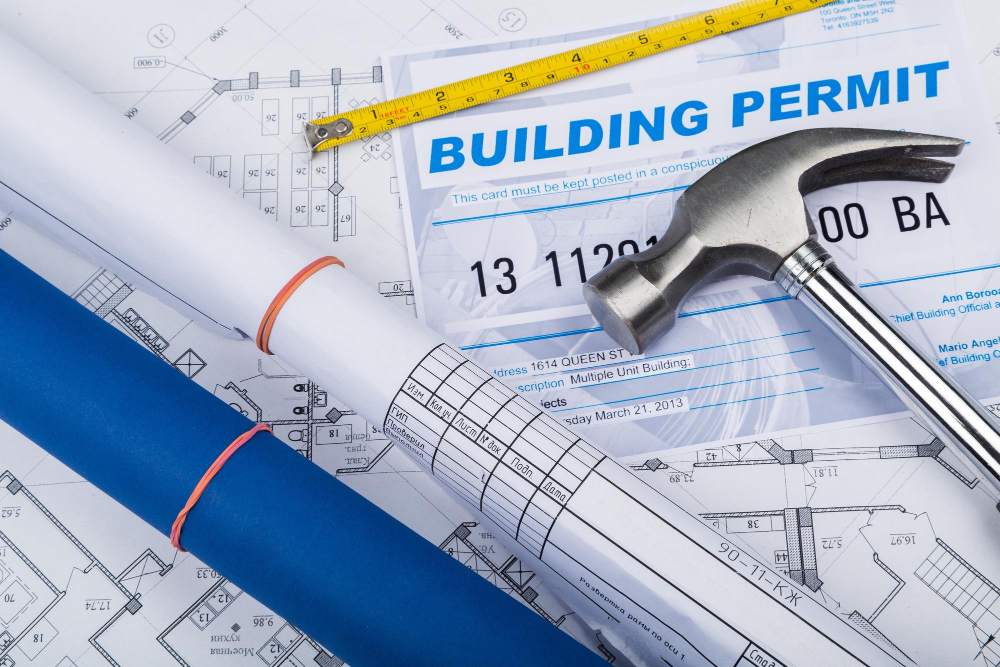
The most common types of permits for kitchen renovations include electrical, plumbing, and building permits.
Electrical Permits: If your cabinet replacement involves any electrical work such as installing new lighting fixtures or outlets in the cabinets themselves, then an electrical permit is required. This ensures that all wiring is up to code and safe.
Plumbing Permits: Similarly, if you’re planning on moving or replacing sinks or other plumbing fixtures during your cabinet replacement project then a plumbing permit will be necessary. This type of permit ensures that all pipes are installed correctly and safely.
Building Permits: A building permit may be required if you plan on making structural changes to the kitchen layout such as removing walls or changing doorways. Building permits ensure that any modifications made comply with local codes and regulations regarding safety standards for load-bearing structures.
When Do You Need a Permit for Kitchen Cabinets
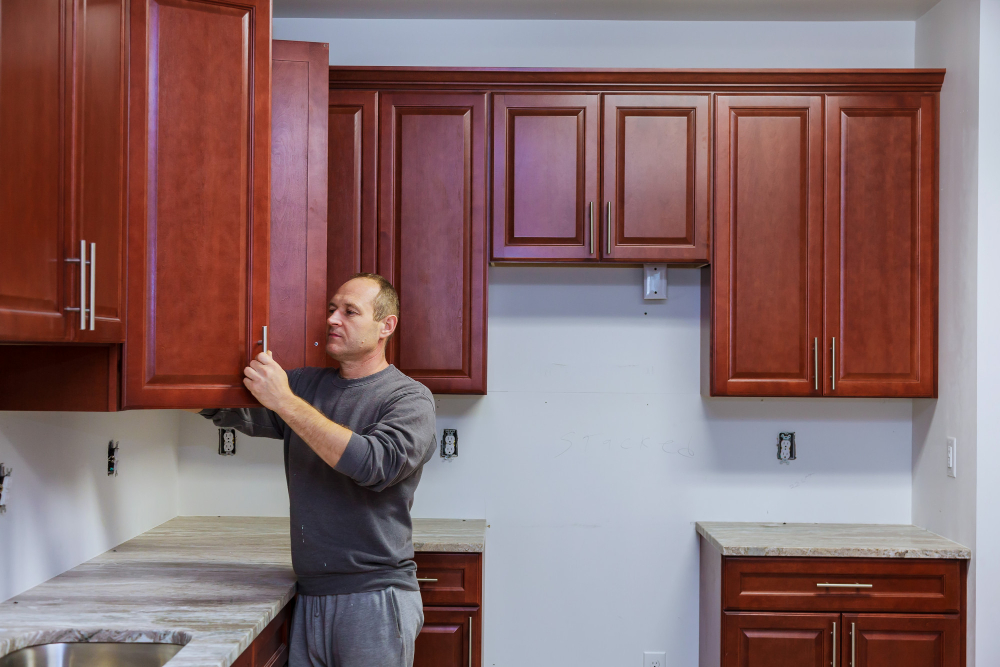
The answer to this question depends on several factors, including the scope of your renovation project and where you live. In general, if you’re only replacing the cabinets without making any structural changes or altering electrical or plumbing systems, then a permit may not be required.
However, if your kitchen cabinet replacement involves significant modifications such as moving walls or changing the layout of your kitchen space that affects electrical wiring and plumbing lines in any way – then it’s likely that you’ll need a permit.
It’s important to note that local regulations vary from one jurisdiction to another. Some cities require permits for all types of home improvement projects regardless of their size and complexity while others have more relaxed rules regarding minor renovations like cabinet replacements.
To determine whether or not you need a permit for your kitchen cabinet replacement project, check with your local building department before starting work on anything else.
Permits Most Likely Required

In general, permits are most likely required if the renovation involves structural changes or electrical and plumbing work. For instance, if you plan to move your sink or add new lighting fixtures during the cabinet replacement process, then it’s highly probable that a permit will be necessary.
Some local building codes may require permits for any type of home improvement project regardless of its scope. Therefore it is essential to check with your local authorities before starting any renovation work in order not to violate regulations and face legal consequences later on.
It’s important not only for compliance but also for safety reasons as obtaining proper permits ensures that all work is done according to code standards which can prevent accidents from happening in the future.
Permits May Be Required
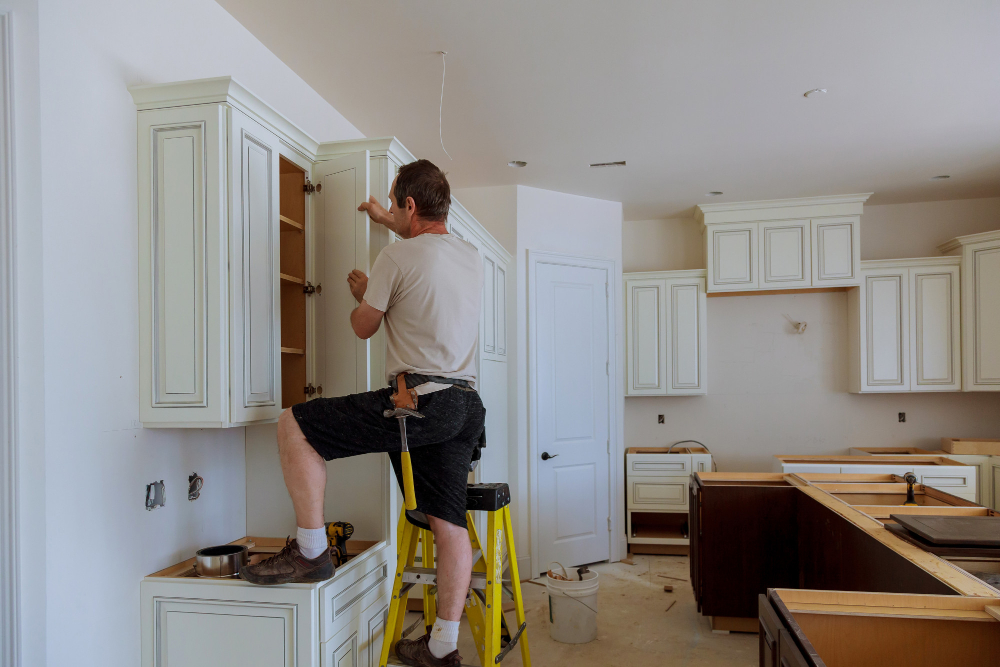
The need for a permit depends on several factors such as the scope of work and local regulations. In some cases, if you’re only replacing the cabinet doors or hardware, a permit may not be necessary.
However, if you plan to move or add electrical outlets or plumbing fixtures during the renovation process, then a permit will likely be required.
It’s essential to check with your local building department before starting any kitchen renovation project involving cabinet replacement. They can provide information about specific requirements in your area and help determine whether or not you need a permit.
Keep in mind that even if permits are not explicitly required by law for certain types of renovations like replacing cabinets alone; it is still advisable always to obtain one since this ensures compliance with safety standards and avoids potential legal issues down the line.
Checking Permit Requirements

The requirements for permits vary depending on the location and scope of the renovation project. Some areas may require permits for all types of home improvement projects, while others may only require them for specific renovations.
To determine if you need a permit to replace your kitchen cabinets, start by checking with your local building department or city hall. They will be able to provide information about the specific regulations in your area and guide you through the process of obtaining any necessary permits.
It’s important not to skip this step as failing to obtain required permits can result in fines and legal consequences down the line. Having proper documentation ensures that any work done is up-to-code and safe for use.
In some cases, homeowners may be exempt from obtaining certain types of permits if they are doing minor renovations themselves without professional help. However, it’s always best practice to double-check with local authorities before starting any work on a home renovation project.
How to Obtain a Permit for Kitchen Cabinet Replacement

The process of obtaining a permit can vary depending on where you live and the specific regulations in your area. However, there are some general steps that most homeowners will need to follow.
Firstly, check with your local building department or city hall to find out what permits are required for kitchen renovations in your area. You may be able to find this information online as well.
Once you know which permits are necessary, gather all of the necessary documentation and fill out any required forms completely and accurately. This may include plans or drawings of the new cabinets along with details about materials used.
After submitting all paperwork and paying any associated fees (which can vary widely), wait for approval from local authorities before beginning work on replacing those old cabinets!
Permit Costs and Fees

In some areas, permits are free or have a nominal fee. However, in other regions where building codes are strict or require more inspections than usual to ensure safety standards are met during construction projects like kitchen cabinet replacement may be expensive.
It’s essential to factor in permit costs when budgeting for your renovation project as they can add up quickly. The fees associated with obtaining permits can range from $50-$500 depending on where you live.
There may be additional fees if you hire professionals such as architects or engineers to help with the design process before applying for a permit. It’s important to note that these costs vary by region and should always be factored into your overall budget when planning any home improvement project.
Permit Costs and Duration for Kitchen Cabinet Replacement

In some areas, permits are free or have a nominal fee. However, in other regions where more extensive renovations are required to obtain permits, costs can range from $50 to $500.
In addition to fees associated with obtaining a permit for kitchen cabinet replacement is the duration it takes to get one. The time frame also depends on your local government’s regulations and how quickly they process applications.
It’s essential that you factor in these costs when planning your budget for renovating your kitchen cabinets so that you don’t end up spending more than anticipated.
Remember that getting a permit is not only necessary but also ensures safety during construction work as well as compliance with building codes. It may seem like an extra step in an already lengthy process but taking shortcuts could lead to costly consequences down the line if something goes wrong during installation or inspection by authorities.
Applying for a Permit

Applying for permits can be time-consuming and overwhelming, but it’s an essential part of any renovation project. The process may vary depending on where you live and the type of permit required.
To start with, visit your local government office or check their website to find out what documents are needed when applying for a permit. You’ll typically need detailed plans showing what changes will be made in your kitchen along with other supporting documents such as contractor licenses and insurance certificates.
Once all requirements have been met, submit the application form along with all necessary documentation at least several weeks before starting work on your cabinets. This allows enough time for processing so that everything is ready by the time construction begins.
It’s important to note that some cities require inspections during different stages of construction while others only require final inspection after completion of work. Be sure to follow up regularly throughout this process until approval has been granted.
Tips for a Smooth Permit Process

Applying for permits can be overwhelming and confusing, but with these tips, you can make the process smoother:
1. Research local regulations: Every city has its own set of rules and regulations when it comes to home improvement projects.
Make sure you research what is required in your area before starting any work.
2. Hire professionals: If possible, hire licensed contractors who are familiar with local building codes and permit requirements.
3. Plan ahead: Apply for permits well in advance of starting any work on your kitchen cabinets as processing times may vary depending on where you live.
4. Be prepared: Gather all necessary documents such as floor plans or blueprints before applying for a permit.
5. Follow instructions carefully: Read through all instructions provided by the permitting office carefully so that there are no mistakes made during the application process which could delay approval times.
DIY Vs. Hiring Professionals
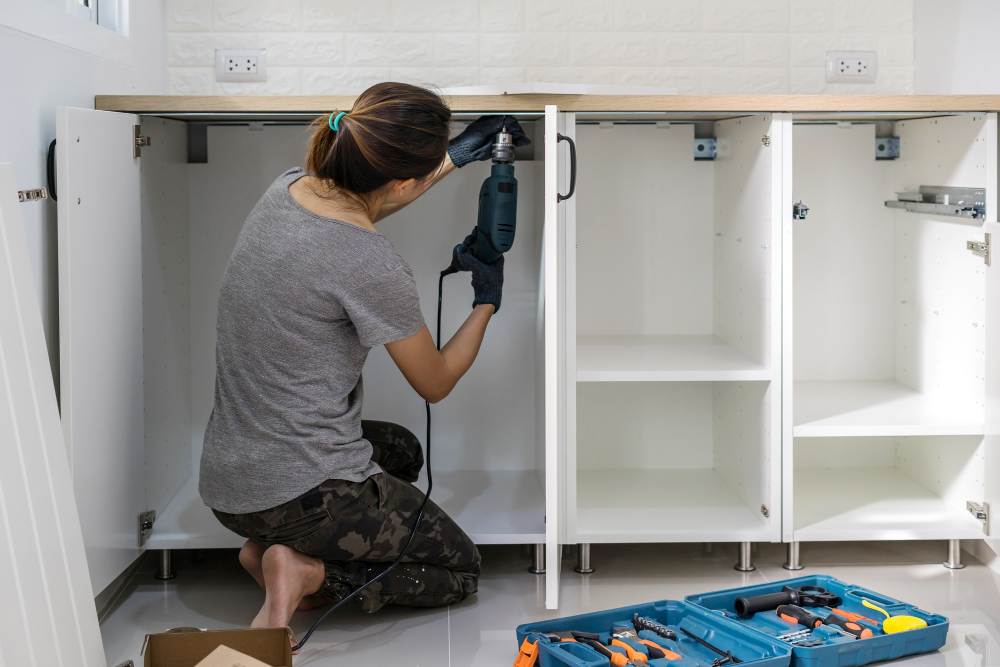
While DIY projects can save money, they also come with risks and challenges that could end up costing more in the long run. On the other hand, hiring professionals ensures quality workmanship but at a higher cost.
If you’re confident in your skills and have experience with home improvement projects, then DIY might be an option for you. However, keep in mind that cabinet replacement involves more than just removing old cabinets and installing new ones.
You’ll need to measure accurately; ensure proper alignment of doors and drawers; install hardware correctly; make sure everything is levelled properly – all while working around plumbing fixtures.
Hiring professionals may seem like an expensive option upfront but consider their expertise when it comes to handling permits as well as ensuring compliance with local regulations during installation. They will also take care of any unforeseen issues that arise during installation without causing further damage or delays.
Working With Contractors and Kitchen Cabinet Permits

Working with licensed and insured contractors can give you peace of mind knowing that they are knowledgeable about local regulations and will complete the job safely and correctly.
Before hiring a contractor, ask them if they have experience obtaining permits for similar projects. A reputable contractor should be able to provide proof of their license, insurance coverage, and any required certifications or training.
It’s also important to communicate openly with your chosen contractor about permit requirements before starting work on your kitchen cabinets. Make sure both parties understand who is responsible for obtaining the necessary permits before beginning any work.
Remember that working without proper permits can result in fines or even legal action against both homeowners and contractors involved in the renovation project.
Working Without a Permit

It’s essential to understand the risks and consequences of doing so. If you replace your kitchen cabinets without obtaining the necessary permits, you could face legal issues down the line.
Firstly, working without a permit is illegal and can result in hefty fines from local authorities. If something goes wrong during your renovation project that causes damage or injury to someone else’s property or person – even years after completion – then liability falls squarely on those who worked on it illegally.
Moreover, when selling your home in the future with unpermitted work done such as replacing kitchen cabinets; buyers may request proof of permits for any renovations made before they purchase their new property. Without proper documentation showing that all work was permitted by law enforcement agencies at every stage throughout construction (including inspections), potential buyers may not want anything more than an empty house!
Consequences of Non-Compliance

Not obtaining a required permit can result in serious consequences that could end up costing you more than just time and money.
Firstly, if an inspector discovers that work has been done without a proper permit, they may issue a stop-work order until the necessary permits are obtained. This means all work must cease immediately until compliance is achieved.
Secondly, fines and penalties can be imposed on homeowners who fail to obtain necessary permits before starting their renovation projects. These fees vary depending on location but can range from hundreds to thousands of dollars.
Lastly, non-compliance with local building codes could lead to safety hazards or structural issues down the line which will require costly repairs or even demolition in some cases.
It’s always best practice to follow regulations and obtain any required permits before beginning any home improvement project – including replacing your kitchen cabinets.
Consequences of Skipping a Cabinet Replacement Permit

If you’re caught working without the necessary permits, you could face hefty fines or even legal action. If your home insurance company finds out that you’ve made significant changes to your property without obtaining proper permits and inspections, they may refuse coverage in case of damage or accidents.
Moreover, unpermitted work can also affect the resale value of your home. When selling a house with unpermitted renovations such as kitchen cabinets replacement done by yourself or an unlicensed contractor who didn’t obtain required permits from local authorities; buyers might be hesitant because they don’t want any issues with code violations down the line.
FAQ
Does a kitchen remodel require a permit Florida?
A kitchen remodel in Florida generally requires a permit if it involves major changes that alter the floorplan of the home, while minor updates like new flooring, paint, countertops, and faucets typically do not.
Do you need a permit to remodel a kitchen in MD?
In MD, a permit is required for kitchen remodeling if it involves reconstruction or renovation to the existing structure, but not for painting, wallpapering, replacing faucets, installing countertops, flooring, or tiles without structural changes.
Do I need a permit to install kitchen cabinets California?
In California, a permit is required for kitchen remodel projects, including the installation of kitchen cabinets.
Do you need a permit to replace kitchen cabinets in NJ?
In New Jersey, a building permit is generally required for kitchen renovations, which includes replacing kitchen cabinets.
Is a permit necessary for kitchen cabinet replacement in Texas?
A permit is generally not necessary for kitchen cabinet replacement in Texas.
What are the permit requirements for kitchen renovation in New York?
In New York, the permit requirements for kitchen renovation include obtaining a work permit from the Department of Buildings.
Do you need a permit for updating kitchen cabinets in Illinois?
In Illinois, a permit is not required for updating kitchen cabinets.




